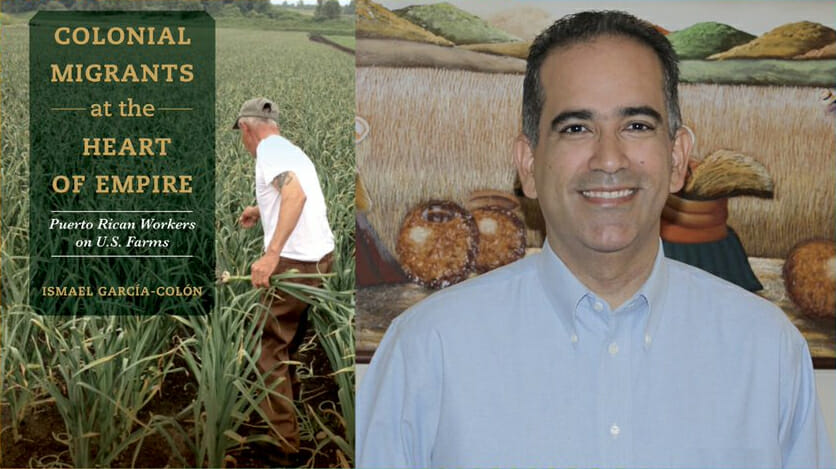The Puerto Rican Studies Association has named College of Staten Island Professor Ismael García-Colón the winner of its coveted Frank Bonilla Book Award. García-Colón’s book, Colonial Migrants at the Heart of Empire: Puerto Rican Workers on U.S. Farms, was released in February of 2020, and explores the plight of migrant farm workers from Puerto Rico, U.S. citizens categorized as foreign others, and their struggle with prejudice and assimilation.
Awarded every other year, the Frank Bonilla Book Award is the PRSA’s highest honor, and serves to honor work that compellingly engages issues and concerns of Puerto Ricans and their communities. It is named in honor of one of the leading figures of Puerto Rican study in U.S. history, Frank Bonilla. For García-Colón, the award means a great deal considering its namesake.
“To be acknowledged in this way is an honor for me, because I feel the book is a continuation of the work and research that Frank Bonilla did as a pioneer for Puerto Rican studies,” he noted. “More than anything, it has given me the energy and enthusiasm to pursue my research further.”
García-Colón notes that writing the book was a labor of love, and a chance to look into his own roots. “Growing up in Puerto Rico, I would hear how many of our people had migrated to the States. I learned that my father had an uncle who migrated as a farmworker who lived in Lancaster, but I didn’t fully understand the impact the movement had,” he said.
García-Colón became more familiar with the research while working the archives at the Center for Puerto Rican Studies, making it a focus of his graduate dissertation, and that’s when he became invested. “I learned that there was still a vast community of Puerto Rican migrant workers in Southern New Jersey, and traveled there to interview them and to conduct research.” Ignited by the dialogue, García-Colón researched tens of thousands of articles and essays over 15 years and made constant trips to Puerto Rico to interview former migrant workers and to further his research. “People don’t tend to tie Puerto Ricans to this type of work and the farm labor migration, but it still exists today.”
García-Colón is now hoping his text is seen as a historical reference and resource. He notes that Puerto Rican migrant workers were a unique study to the migrant worker story in the U.S., subject to prejudice and evolving immigrant policy despite their U.S. citizenship, and their fight to overcome poverty while establishing the Latinization of the U.S. farm force. He says, “Where I feel my book may be different than others is in comparing the Puerto Rican experience with other immigrant populations of farm workers in the Unites States,” he explained. “Immigration and guest worker programs shaped the migrant farm worker experience, giving Puerto Ricans the opportunity for work at times when there was much anti-immigrant sentiment in the States, but it also subjected them to some of the same coercion and bias that many immigrants faced, what scholars in the social sciences call, the deportation regime.”
Part of the Anthropology program, García-Colón served as Chair for the Master’s of Liberal Studies program at CSI as well, and feels his research and this recent honor given to him by the PRSA will continue the work of telling the migrant’s story in the U.S. “Receiving this honor lends importance to the work and I hope that the book can be used in the research and the bibliographies of Puerto Rican migration study. It is a nice feeling to know that people are paying attention to this important work, as part of both Puerto Rican culture and United States history.”
The PRSA will officially bestow honors on García-Colón this coming fall in a virtual awards ceremony. He is the fifth winner in the award’s history, and his work will be cited along with Honorable Mention recipients Helena Hansen (Addicted to Christ: Remaking Men in Puerto Rican Pentecostal Drug Ministries), and Patricia Silver (Sunbelt Diaspora: Race, Class and Latino Politics in Puerto Rican Orlando).
By Dave Pizzuto














